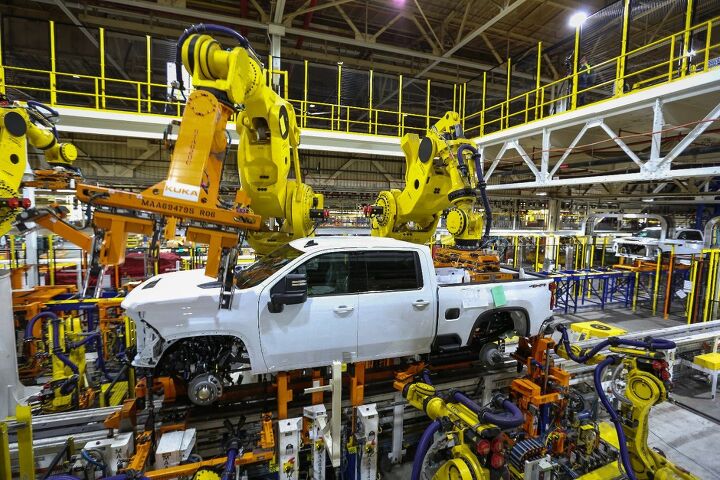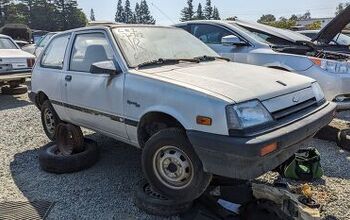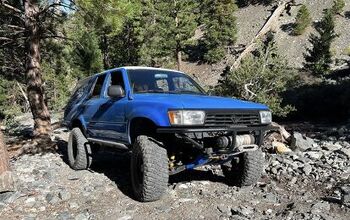Report: Semiconductor Chip Shortage Could Affect 4 Million Vehicles

The semiconductor shortage marches onward with no real end in sight. Supply chains remain a tangled mess following a year of pandemic-related restrictions and demand remains ridiculously high as we unnecessarily network and digitize increasingly more consumer goods (e.g. toothbrushes).
Though this website is really only concerned with the pace of automotive factories — most of which seem operating at the industrial equivalent of driving on the shoulder with the hazards on. The global number of vehicles lost in announced shutdowns and line slowdowns as a result of chip shortages is swiftly closing in on 3 million and estimates have it continuing on unabated for the rest of 2021.
Automotive News has kept weekly tabs on the domestic side of the equation, with plenty of help from AutoForecast Solutions, noting that the last seven-day period was particularly rough on Ford and Stellantis. North American facilities came up 151,000 vehicles short of their normal production schedules over the last week, with the outlet updating its own projections. Analysts are now estimating the automotive sector could come up 4 million units shy of where it would have liked to be before the chip shortage took hold.
From AN:
Among the 93,000 Ford vehicles taken out of North American production schedules last week were 28,000 Escape compact crossovers (Louisville, Ky.); 35,000 F-Series pickups (Dearborn, Mich., and Kansas City, Mo.); 7,000 Edge midsize crossovers (Oakville, Ontario); and 6,500 Explorer crossovers (Chicago).
Stellantis took nearly 38,000 vehicles out of its North American production schedules, including 36,000 Jeep Cherokee SUVs (Belvidere, Ill.) and 1,100 Chrysler Voyager minivans and 900 Chrysler Pacifica minivans (Windsor, Ontario).
With everything from toasters to televisions being hit by the semiconductor shortage, there’s seemingly no limit to how bad things can get. But it’s the automotive industry that’s unquestionably taking the most severe beating. We doubt it will be long before industry giants begin requesting financial assistance from local governments.
In the interim, manufacturers are reducing the amount of technology that’s been going into vehicles. Ram has cut the fancy, intelligent rear-view mirror from the 1500 pickup and Nissan has made navigational systems optional equipment on some vehicles that previously included it. But these are just a couple of examples from an industry that’s cutting corners the world over to help mitigate the crisis.
Meanwhile, tensions in Asia continue to swell. China has repeatedly signaled that it will eventually invade Taiwan — an island that just so happens to be ground zero for semiconductor production — using the pretense that it’s not actually a sovereign nation. The Chinese Communist Party sees its decades of independence as a matter of secession, claiming nothing can block the alleged “reunification” of the two countries. Blockades have also been hinted at, which would have similarly dire consequences for chip supply channels.
[Image: General Motors]

A staunch consumer advocate tracking industry trends and regulation. Before joining TTAC, Matt spent a decade working for marketing and research firms based in NYC. Clients included several of the world’s largest automakers, global tire brands, and aftermarket part suppliers. Dissatisfied with the corporate world and resentful of having to wear suits everyday, he pivoted to writing about cars. Since then, that man has become an ardent supporter of the right-to-repair movement, been interviewed on the auto industry by national radio broadcasts, driven more rental cars than anyone ever should, participated in amateur rallying events, and received the requisite minimum training as sanctioned by the SCCA. Handy with a wrench, Matt grew up surrounded by Detroit auto workers and managed to get a pizza delivery job before he was legally eligible. He later found himself driving box trucks through Manhattan, guaranteeing future sympathy for actual truckers. He continues to conduct research pertaining to the automotive sector as an independent contractor and has since moved back to his native Michigan, closer to where the cars are born. A contrarian, Matt claims to prefer understeer — stating that front and all-wheel drive vehicles cater best to his driving style.
More by Matt Posky
Latest Car Reviews
Read moreLatest Product Reviews
Read moreRecent Comments
- ToolGuy "Nothing is greater than the original. Same goes for original Ford Parts. They’re the parts we built to build your Ford. Anything else is imitation."
- Slavuta I don't know how they calc this. My newest cars are 2017 and 2019, 40 and 45K. Both needed tires at 30K+, OEM tires are now don't last too long. This is $1000 in average (may be less). Brakes DYI, filters, oil, wipers. I would say, under $1500 under 45K miles. But with the new tires that will last 60K, new brakes, this sum could be less in the next 40K miles.
- BeauCharles I had a 2010 Sportback GTS for 10 years. Most reliable car I ever own. Never once needed to use that super long warranty - nothing ever went wrong. Regular maintenance and tires was all I did. It's styling was great too. Even after all those years it looked better than many current models. Biggest gripe I had was the interior. Cheap (but durable) materials and no sound insulation to speak of. If Mitsubishi had addressed those items I'm sure it would have sold better.
- Marty S I learned to drive on a Crosley. Also, I had a brand new 75 Buick Riviera and the doors were huge. Bent the inside edge of the hood when opening it while the passenger door was open. Pretty poor assembly quality.
- 3-On-The-Tree Alan, I was an Apache pilot and after my second back surgery I was medically boarded off of flying status due to vibrations, climbing on and off aircraft, so I was given the choice of getting out or re-branching so I switched to Military Intel. Yes your right if you can’t perform your out doesn’t matter if your at 17 years. Dad always said your just a number, he was a retired command master chief 25 years.


































Comments
Join the conversation
Next up: • Lease extensions • Reserve-Your-New-Vehicle-Now-and-Drive-(THIS)-Until-We-Can-Build-It programs [the OEM's will come up with better cutesy names] You heard it here first. (The advertising copy almost writes itself [look for the word "America" to be used a lot].)
Fascinating political discussions aside: I read that part of the reason is that auto companies suck to work with and they are cheap compared to other buyers, so ended up at the end of the line for components....which would make sense. Practically it means keep whatever you have running. My local dealers have no stock to speak of.